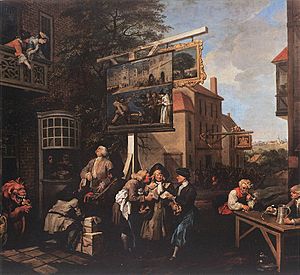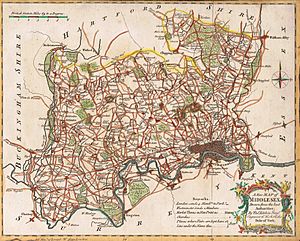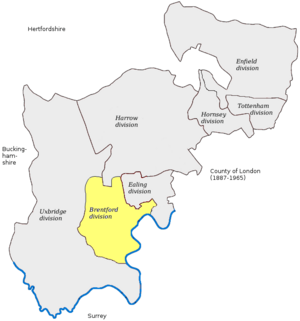Middlesex (UK Parliament constituency) facts for kids
Quick facts for kids {{{Name}}}[[{{{Type}}} constituency]] |
|
|---|---|
| [[Image:{{{Map1}}}Constituency.svg|120px|]] [[Image:England{{{Map2}}}.svg|120px|]] |
|
| {{{Name}}} shown within [[{{{Entity}}}]], and {{{Entity}}} shown within England | |
| Created: | {{{Year}}} |
| MP: | {{{MP}}} |
| Party: | {{{Party}}} |
| Type: | House of Commons |
| County: | [[{{{County}}}]] |
| EP constituency: | [[{{{EP}}} (European Parliament constituency)|{{{EP}}}]] |
Middlesex was an important area in England that sent representatives to the House of Commons. This is like the main meeting place where laws are made for the country. Middlesex sent two people, called Members of Parliament (or MPs), to represent its people.
This area was a "constituency" from 1265 until 1885. This means it was a specific area that voted for its own MPs. Over time, the way people voted and the exact borders of Middlesex changed.
What Was the Middlesex Area Like?

The Middlesex constituency covered most of the old county of Middlesex. This area is now a big part of Greater London. Its southern edge was the River Thames.
For a long time, only certain people could vote. These were usually men who owned land worth a certain amount of money. This was called being a "forty shilling freeholder." As time passed, more people became wealthy. This meant more people could vote.
How Elections Were Held
Before 1700, elections for Middlesex were held at Hampstead Heath. After that, they moved to The Butts in Brentford. Elections were often public events called "hustings." Candidates would try to convince people to vote for them. Sometimes, candidates would even try to bribe voters. This was a common problem back then.
Changes to Voting Rules
Over the years, the number of voters grew. In the late 1600s, there were about 1,660 voters. By the early 1800s, this number had grown to about 6,000. New laws, like the Reform Act 1832 and Reform Act 1867, changed who could vote. These laws made it possible for more people to have a say.
New Voting Areas Created from Middlesex
As London grew, new towns and cities appeared in Middlesex. These areas became so big that they needed their own MPs.
- In 1832, three new areas were created: Finsbury, Marylebone, and Tower Hamlets. Each of these areas sent two MPs to Parliament.
- In 1867, two more areas were created: Hackney and Chelsea. They also sent two MPs each.
- There was also a special "University constituency" for London University graduates.
The End of the Middlesex Constituency
In 1885, big changes happened. The old Middlesex constituency was divided into seven smaller areas. Each of these new areas sent just one MP to Parliament. This was done to make sure that more urban areas had fair representation.
The new areas were: Brentford, Ealing, Enfield, Harrow, Hornsey, Tottenham and Uxbridge.
Who Represented Middlesex?
Middlesex was represented by many different people over the centuries. They were called "Knights of the Shire" in earlier times. These MPs were chosen to speak for the people of Middlesex in Parliament.
From 1265 to 1885, many individuals served as MPs for Middlesex. They came from different backgrounds and political groups. Some were independent, while others belonged to parties like the Whigs or Tories. Later, the Radicals and Liberals also had representatives.
The tables below show some of the people who served as MPs for Middlesex.
Early Knights of the Shire (1295–1509)
| Parliament | First member | Second member |
|---|---|---|
| 1295 (Nov) | William de Brook | Stephen de Gravesend |
| 1296 | Richard de Wyndesor | Richard le Rous |
| 1297 (Oct) | Richard le Rous | ? |
| 1298 (Mar) | Richard le Rous | ? |
| 1298 (May) | Richard le Rous | ? |
| 1300 | Richard le Rous | ? |
| 1301 | Richard le Rous | ? |
| 1302 (Oct) | Richard le Rous | ? |
| 1305 (Feb) | Richard le Rous | ? |
| 1306 | Richard le Rous | ? |
| 1386 | Sir Adam Francis | William Swanland |
| 1388 (Feb) | Sir Adam Francis | William Swanland |
| 1388 (Sep) | William Barnville | Godfrey Atte Perry |
| 1390 (Jan) | John Shorditch I | Thomas Coningsby |
| 1390 (Nov) | John Shorditch I | Sir Adam Francis |
| 1391 | Thomas Bray | William Norton |
| 1393 | William Tamworth | Thomas Maidstone |
| 1394 | John Shorditch II | James Ormesby |
| 1395 | John Shorditch II | Thomas Coningsby |
| 1397 (Jan) | Thomas Goodlake | Thomas Maidstone |
| 1397 (Sep) | Sir Adam Francis | Sir John Wroth |
| 1399 | John Durham | Thomas Maidstone |
| 1401 | William Loveney | Sir John Wroth |
| 1402 | James Northampton | Thomas Coningsby |
| 1404 (Jan) | William Wroth | Sir John Wroth |
| 1404 (Oct) | Sir Roger Strange | William Powe |
| 1406 | Henry Somer | Sir John Wroth |
| 1407 | Henry Somer | William Loveney |
| 1410 | ||
| 1411 | Sir Adam Francis | Sir Roger Strange |
| 1413 (Feb) | ||
| 1413 (May) | William Loveney | Richard Wyot |
| 1414 (Apr) | Simon Camp | Walter Green |
| 1414 (Nov) | Thomas Charlton | John Walden |
| 1415 | Simon Camp | Thomas Coningsby |
| 1416 (Mar) | ||
| 1416 (Oct) | Henry Somer | Walter Gawtron |
| 1419 | Thomas Frowyk | Thomas Coningsby |
| 1420 | Sir John Boys | Walter Green |
| 1421 (May) | Henry Somer | Sir Thomas Charlton |
| 1421 (Dec) | Richard Maidstone | Edmund Bibbesworth |
| 1429 | Henry Somer | |
| 1442 | Thomas Charlton | John Somerset |
| 1447 | Thomas Charlton | |
| 1449 | Thomas Charlton | |
| 1453 | Thomas Charlton | |
| 1459 | Sir Thomas Charlton | |
| 1460 | Sir Thomas Charlton | |
| 1491 | Sir Thomas Lovell |
Knights of the Shire (1509–1660)
| Summoned | Elected | Assembled | Dissolved | First Member | Second Member |
|---|---|---|---|---|---|
| 17 October 1509 | 1509–10 | 21 January 1510 | 23 February 1510 | Sir Thomas Lovell (I) | unknown |
| 28 November 1511 | 1511–12 | 4 February 1512 | 4 March 1514 | unknown | unknown |
| 23 November 1514 | 1514–15 | 5 February 1515 | 22 December 1515 | unknown | unknown |
| unknown | 1523 | 15 April 1523 | 13 August 1523 | Sir Thomas More (I) a | unknown |
| 9 August 1529 | 1529 | 3 November 1529 | 14 April 1536 | Robert Wroth b | Richard Hawkes c |
| 27 April 1536 | 1536 | 8 June 1536 | 18 July 1536 | unknown | unknown |
| 1 March 1539 | 1539 | 28 April 1539 | 24 July 1540 | Sir Ralph Sadler | Robert Cheeseman |
| 23 November 1541 | 1541–42 | 16 January 1542 | 28 March 1544 | Robert Cheeseman | John Hughes d |
| 1 December 1544 | 1544–45 | 23 November 1545 | 31 January 1547 | Sir William Paget | Thomas Wroth |
| 2 August 1547 | 1547 | 4 November 1547 | 15 April 1552 | Sir Thomas Wroth | John Newdigate |
| 5 January 1553 | 1553 | 1 March 1553 | 31 March 1553 | Sir Robert Bowes | Sir Thomas Wroth |
| 14 August 1553 | 1553 | 5 October 1553 | 5 December 1553 | Sir Edward Hastings | John Newdigate |
| 17 February 1554 | 1554 | 2 April 1554 | 3 May 1554 | Sir Edward Hastings | John Newdigate |
| 3 October 1554 | 1554 | 12 November 1554 | 16 January 1555 | Sir Edward Hastings | Sir Roger Cholmley |
| 3 September 1555 | 1555 | 21 October 1555 | 9 December 1555 | Sir Edward Hastings | Sir Roger Cholmley |
| 6 December 1557 | 1557–58 | 20 January 1558 | 17 November 1558 | Sir Roger Cholmley | John Newdigate |
| 5 December 1558 | 29 December 1558 | 23 January 1559 | 8 May 1559 | Sir Roger Cholmley | Sir Thomas Wroth |
| 10 November 1562 | 1562–63 | 11 January 1563 | 2 January 1567 | Sir William Cordell | Sir Thomas Wroth |
| unknown | 1571 | 2 April 1571 | 29 May 1571 | Francis Newdigate | John Newdigate |
| 28 March 1572 | 1572 | 8 May 1572 | 19 April 1583 | Robert Wroth (I) | Sir Owen Hopton |
| 12 October 1584 | 1584 | 23 November 1584 | 14 September 1585 | Robert Wroth (I) | Sir Owen Hopton |
| 15 September 1586 | 1586 | 15 October 1586 | 23 March 1587 | Robert Wroth (I) | William Fleetwood (III) |
| 18 September 1588 | 19 December 1588 | 4 February 1589 | 29 March 1589 | Robert Wroth (I) | William Fleetwood (III) |
| 4 January 1593 | 1593 | 18 February 1593 | 10 April 1593 | Robert Wroth (I) | Francis Bacon |
| 23 August 1597 | 15 September 1597 | 24 October 1597 | 9 February 1598 | Sir Robert Wroth (I) | Sir John Peyton (I) |
| 11 September 1601 | 8 October 1601 | 27 October 1601 | 19 December 1601 | Sir John Fortescue (I) | Sir Robert Wroth (I) |
| 31 January 1604 | 1604 | 19 March 1604 | 9 February 1611 | Sir William Fleetwood | Sir Robert Wroth |
| unknown | 1614 | 5 April 1614 | 7 June 1614 | Sir Julius Caesar | Sir Thomas Lake |
| 13 November 1620 | 1620–21 | 16 January 1621 | 8 February 1622 | Sir Francis Darcy | Sir Gilbert Gerard, Bt |
| 20 December 1623 | 1623–24 | 12 February 1624 | 27 March 1625 | Sir Gilbert Gerard, Bt | Sir John Suckling |
| 2 April 1625 | 1625 | 17 May 1625 | 12 August 1625 | Sir John Francklyn | Sir Gilbert Gerard, Bt |
| 20 December 1625 | 1626 | 6 February 1626 | 15 June 1626 | Sir Gilbert Gerard, Bt | Sir Edward Spencer |
| 31 January 1628 | 1628 | 17 March 1628 | 10 March 1629 | Sir Francis Darcy | Sir Henry Spiller |
| 1629–1640 | No Parliaments summoned | ||||
| 20 February 1640 | 1640 | 13 April 1640 | 5 May 1640 | Sir John Francklyn | Sir Gilbert Gerard, Bt |
| 24 September 1640 | 1640 | 3 November 1640 | 16 March 1660 e | Sir John Francklyn f | Sir Gilbert Gerard, Bt g |
| 18 May 1648 | Sir Edward Spencer h | ||||
Notes:-
- a Speaker of the House of Commons.
- b Wroth stopped being an MP after 11 May 1535. We don't know if a new election was held.
- c Hawkes stopped being an MP by May/June 1532. We don't know if a new election was held.
- d Hughes stopped being an MP after January/April 1543. We don't know if a new election was held.
- e The Long Parliament was supposed to last a long time, but sometimes members were not allowed to sit.
- f Francklyn died, and a new election was held.
- g In December 1648, Gilbert was removed from Parliament, and his seat was empty.
- h Spencer is not recorded as having sat after December 1648.
Members of the Commonwealth Parliaments (1653-1659)
During this time, the way MPs were chosen changed.
| Summoned | Elected | Assembled | Dissolved | 1st Member | 2nd Member | 3rd Member | 4th Member |
|---|---|---|---|---|---|---|---|
| 4 July 1653 | 12 December 1653 | Sir William Roberts | Augustine Wingfield | Arthur Squib | |||
| 1 June 1654 | 1654 | 3 September 1654 | 22 January 1655 | Sir James Harrington, Bt | Sir William Roberts | Josiah Berners | Edmund Harvey |
| 10 July 1656 | 1656 | 17 September 1656 | 4 February 1658 | Sir John Barkstead | Sir William Roberts | Chaloner Chute | William Kiffen |
| 9 December 1658 | 1658–59 | 27 January 1659 | 22 April 1659 | Francis Gerard | Chaloner Chute | ||
Knights of the Shire (1660–1885)
| Year | 1st Member | 1st Party | 2nd Member | 2nd Party | ||
|---|---|---|---|---|---|---|
| 1660 | Sir Lancelot Lake | Non Partisan | Sir William Waller | Non Partisan | ||
| 1661 | Sir Thomas Allen | Non Partisan | ||||
| 1679 | Sir Robert Peyton | Non Partisan | Sir William Roberts, Bt | Non Partisan | ||
| 1681 | Robert Atkyns | Non Partisan | ||||
| 1681 | Nicholas Raynton | Non Partisan | ||||
| 1685 | Sir Charles Gerard, Bt | Non Partisan | Ralph Hawtrey | Non Partisan | ||
| 1695 | Edward Russell | Non Partisan | Sir John Wolstenholme, Bt | Non Partisan | ||
| 1696 | Sir John Bucknall | Non Partisan | ||||
| 1698 | Warwick Lake | Non Partisan | ||||
| 1701 | Hugh Smithson | Tory | ||||
| 1701 | John Austen | Whig | ||||
| 1702 | Hugh Smithson | Tory | ||||
| 1705 | Scorie Barker | Non Partisan | Sir John Wolstenholme, Bt | Non Partisan | ||
| 1709 | John Austen | Whig | ||||
| 1710 | Hon. James Bertie | Tory | Hugh Smithson | Tory | ||
| 1722 | Sir John Austen, Bt. | Whig | ||||
| 1727 | Sir Francis Child | Tory | ||||
| 1734 | William Pulteney | Whig | ||||
| 1740 | Sir Hugh Smithson, Bt (later Sir Hugh Percy, Bt) a |
Tory | ||||
| 1742 | Sir Roger Newdigate, Bt | Tory | ||||
| 1747 | Sir William Beauchamp-Proctor, Bt | Whig | Whig | |||
| 1750 | George Cooke | Tory | ||||
| 1768 | John Wilkes | Radical | ||||
| 1768 | John Glynn | Whig | ||||
| 1769 (Feb) | ||||||
| 1769 (Mar) | ||||||
| 1769 (Apr) | Henry Luttrell | Tory | ||||
| 1774 | John Wilkes | Radical | ||||
| 1779 | Thomas Wood | Whig | ||||
| 1780 | George Byng | Whig | ||||
| 1784 | William Mainwaring | Tory | ||||
| 1790 | George Byng | Whig | ||||
| 1802 | Sir Francis Burdett, Bt | Whig | ||||
| 1804 | George Boulton Mainwaring | Tory | ||||
| 1805 | Sir Francis Burdett, Bt | Whig | ||||
| 1806 | George Boulton Mainwaring | Tory | ||||
| 1806 | William Mellish | Tory | ||||
| 1820 | Samuel Charles Whitbread | Whig | ||||
| 1830 | Joseph Hume | Radical | ||||
| 1837 | Thomas Wood | Conservative | ||||
| 1847 | Lord Robert Grosvenor | Whig | ||||
| 1847 | Ralph Bernal Osborne | Radical | ||||
| 1857 | Robert Culling Hanbury | Whig | ||||
| 1857 | Hon. George Byng (later Viscount Enfield) b |
Whig | ||||
| 1859 | Liberal | Liberal | ||||
| 1867 | Henry Labouchère | Liberal | ||||
| 1868 | Lord George Hamilton | Conservative | ||||
| 1874 | Octavius Coope | Conservative | ||||
| 1885 | constituency divided | |||||
Notes:-
- a Smithson changed his last name to Percy before the 1741 election.
- b Byng received the special title of Viscount Enfield in 1860.
- Leigh Rayment's Historical List of MPs – Constituencies beginning with "M" (part 2)
See also
- List of former United Kingdom Parliament constituencies
- Unreformed House of Commons
- List of parliaments of England
- Duration of English, British and United Kingdom parliaments from 1660
 | Victor J. Glover |
 | Yvonne Cagle |
 | Jeanette Epps |
 | Bernard A. Harris Jr. |



